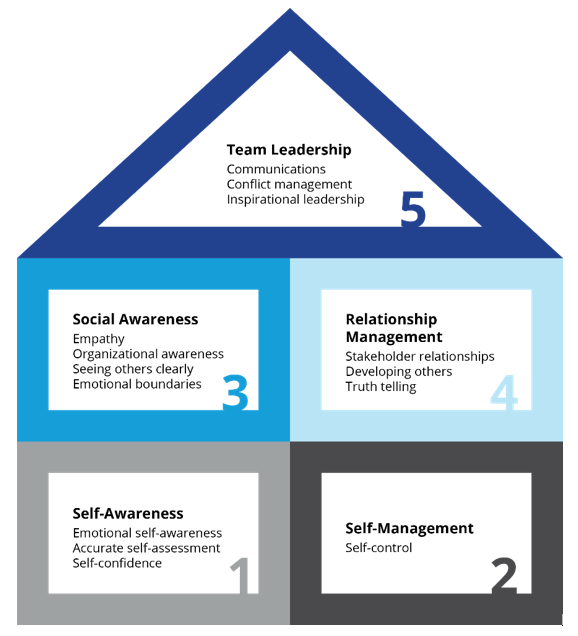I started working as a construction manager for a large contracting company in 2006, and to my surprise, got promoted to project manager a few months later. It was the first time I’d taken on a project management role, and I wasn’t sure I had the skills this type of position required. When I asked my manager why he gave me the promotion, he said that I was very organized and good at positively influencing people. This gave me pause. In most of my previous positions, there was a focus on technical skills, but becoming a project manager made me recognize the importance of softer skills, especially in leadership roles.
Who is the modern project manager?
Since my transition into project management, I’ve been fascinated with the question of “What makes a good project manager?” There are many perspectives on the matter, but I resonated most with an article published by PricewaterhouseCoopers (PwC) titled “Who is the Modern Project Manager?” The article used a term I hadn’t come across before, “Project Influencer.” The article suggests that while project managers are adept at handling business fundamentals, such as scope management, budget control, scheduling and reporting – it isn’t enough to deliver a successful project. The author goes on to explain that to meet the full expectations of the role, you need business acumen and emotional intelligence skills that enable you to build relationships and influence outcomes.
The concept of a “Project Influencer” made a lot of sense to me. As project managers, we often operate in project environments that are complex and multi-layered – from coordinating with various stakeholders to mitigating risks. Keeping a project on a healthy track requires more than just technical skills. You need to be able to identify the “why” behind the project, including how it aligns with your client’s goals, and how to get your team to deliver the best possible results.
There’s a lot that goes into being a capable “Project Influencer,” but for me, one of the most important factors is emotional intelligence.
What is emotional intelligence?
There are many definitions of emotional intelligence (or EQ), but two valuable perspectives come from psychologists Daniel Goleman and Peter Salovey. According to Goleman, EQ is “A person’s ability to manage their feelings so that those feelings are expressed appropriately and effectively.” By comparison, Salovey calls EQ “The ability to monitor one’s own and other’s feelings and emotions, to discriminate among them and to use this information to guide one’s thinking and action.” While both are worthwhile definitions, I personally prefer Salovey’s definition because it links emotional intelligence (our ability to perceive, feel and think) to a desired outcome (our actions).
In addition to Goleman and Salovey, I also appreciate the writings of Anthony Mersino. In his book, Emotional Intelligence for Project Managers: The People Skills You Need to Achieve Outstanding Results, Mersino highlights five pillars that he considers fundamental for strengthening your EQ as a project manager: self-awareness, self-management, social awareness, relationship management and team leadership.

1. Self-awareness
The first step to improving your EQ is gaining self-awareness. If you can’t recognize and manage your own emotions, you’re limited in your ability to read others and respond in a way that is considerate of their emotions. The ability to monitor and manage your own feelings is arguably the hardest part of building EQ. It requires a lot of self-reflection and looking inwards, which has become increasingly difficult with the number of distractions we face daily.
There are plenty of ways to improve your self-awareness, but a few of the practices I recommend include:
- Keeping a journal of your feelings for 30 days. Once complete, reflect on everything you’ve written and what you’ve learned about yourself.
- Taking an EQ test. Psychtests has a scientifically validated Emotional Intelligence Test, but there are several free tests available online.
- Asking for feedback from others and really listening. We often think we’re a better judge of character than we actually are, so getting an outside perspective can be a valuable way to broaden your self-perception.
2. Self-management
Self-management is all about managing your emotions when interacting with others. As a leader of any team or organization, you need to recognize that letting your negative emotions surface can cripple your team’s performance. Essentially, self-management is about managing your negative emotions before they have the opportunity to rise to the surface. This can be difficult. The most primitive part of the human brain (the amygdala) is responsible for “fight or flight” reactions, while our analytical brain (the neocortex), helps us manage perception, decision-making and language. When emotions are high, we’re more likely to let our primitive instincts take over how we think and react.
So, what can you do to curb that? Pause. Breathe. Count from one to 10. Taking a moment to process allows your neocortex to kick in, giving you the opportunity to better manage your reactions. It might sound simple, but it works like a charm!
3. Social awareness
Once you’re able to understand and manage your own emotions, you can begin to tune into other people’s feelings. Social awareness is all about empathy and putting yourself in someone else’s shoes. Being able to do so enables you to communicate in a way that makes people feel understood. Project managers rely on other people’s support to successfully deliver a project. You need to be able to count on owners, consultants, contractors, trades and suppliers to perform their roles effectively so you can manage the project’s delivery. Building connections and rapport with, and amongst each party, enables you get a sense of the project team’s social awareness and actions needed to successfully lead the project.
Tapping into empathy requires constant self-discipline and deliberation. Think of it like a muscle that you need to exercise regularly to make sure it stays in shape. The best way to train yourself to be more empathetic is to actively listen – a practice that encourages you to focus on what the other person is saying, rather than what you’ll say in response. I truly believe every conversation is an opportunity to learn something new, we just need to listen carefully. A good project manager needs to be able to read the room. Keep an eye out for signs of boredom, confusion, or frustration, and diffuse these emotions, so you can build a more collaborative and engaging environment.
4. Relationship management
Practicing EQ and soft skills enables you to build more meaningful relationships with your team members. I’m a big believer in conducting one-on-one meetings with each person on your team. Meeting individually gives you the opportunity to get to know someone better and to gain a better sense of their personal and professional backgrounds, while also allowing them to get to know more about you.
It’s important for project managers to be able to manage both internal and external relationships. It’s not uncommon for you to find yourself managing multiple stakeholders and differing opinions. To be successful, you’ll need to invest time into stakeholder management planning. It can be nearly impossible to get all the information you need about the stakeholders in the first week or month of the project, especially if you’re working with a new team or organization. Take your time, invest in your relationships, and occasionally hold meetings without an agenda so you can meet with stakeholders in person and remind them that you’re all partners in the success of the project.
5. Team leadership
The final pillar of emotional intelligence is team leadership. Once you’ve mastered managing your internal and external client relationships, you can create a work environment that helps you achieve the best possible project results. Some projects will require you to take action to get things up and running smoothly. In these scenarios, it’s important to remember that positivity trickles down from the top. So, whether you’re a client, a client representative, or a project manager, it’s up to you to create the right environment.
The best advice I can offer to create a positive work environment is to take the time to establish the team’s project values early on. Write them down, put them around your project office, communicate them clearly, and regularly refer to them when you feel team members aren’t exhibiting behaviours that align with these values.
Workout your EQ muscle
Taking the time to monitor your emotions and reflect on your reactions is a valuable skill for us all to develop, both inside and outside of the workplace. EQ, like anything else, takes practice. Sure, some people are more naturally gifted than others, but with the right tools and training, anyone can strengthen their EQ skills. Remember to listen, really listen. Because when you take the time to build your EQ and tune into what others are saying, the people around you will feel heard and appreciated. Lastly, investing in your EQ won’t just make you a better project manager, but a more compassionate, empathetic and considerate human being.





